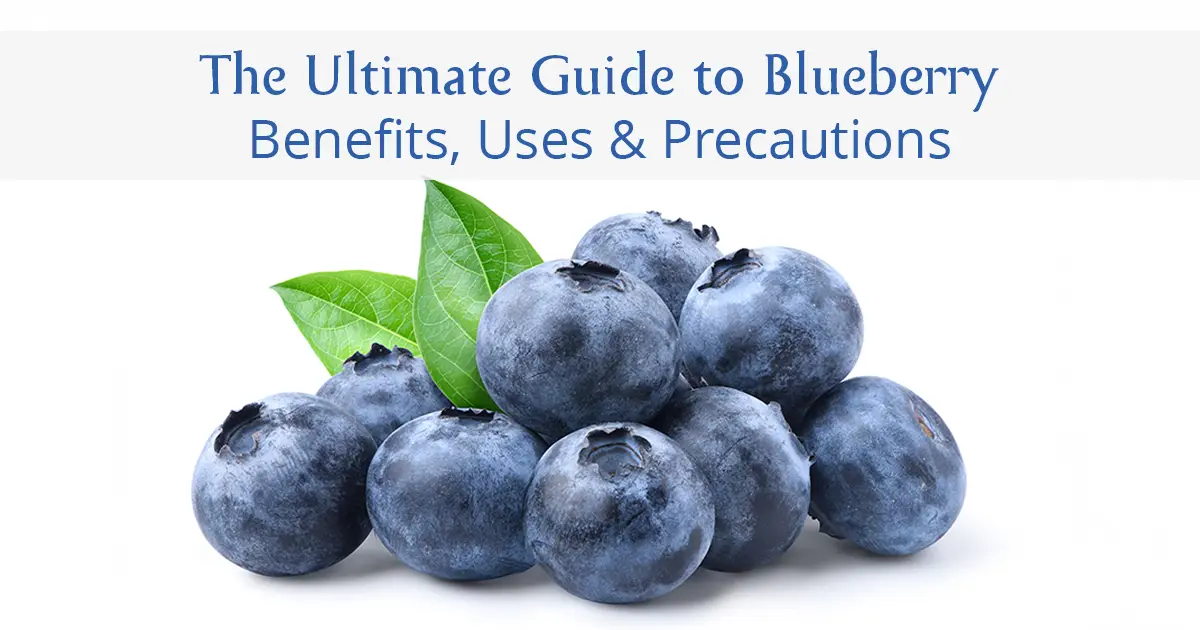
Blueberries made an entry into our daily menus a decade ago. This humble, tiny fruit gained global recognition when its health benefits became famous. Today, it is classified as a superfood owing to its dense nutrient profile. 1
One of the few naturally blue foods found in nature, blueberries are packed with powerful antioxidants, essential vitamins, and vital minerals that support overall health and well-being. From boosting immunity to protecting your heart, these tiny berries offer big benefits.
Tiny, tangy, and bursting with flavour, there are many benefits of blueberry besides being a delicious addition to your salads or fruit bowls, smoothies or desserts. In this guide, we’ll explore everything you need to know about blueberries - what they are, their nutritional value, proven benefits, uses, growing tips, storage, and possible side effects.
What Are Blueberries?
Blueberries are small, round, soft and squishy berries with a deep blue to purple hue. These belong to the Vaccinium genus family. This fruit is native to North America, but is now cultivated in many parts of the world. Blueberries are often called a ‘superfood’ due to their high nutritional content and health-boosting properties. These are found in two main types: 2
- Highbush blueberries - the ones you commonly find in grocery stores.
- Lowbush blueberries - or wild blueberries, smaller but higher in antioxidants.
Blueberry Nutrition Value
Packed with powerful nutrients, blueberries are also low in calories. Here is the nutritional breakdown for 1 cup (around 148 g) of raw blueberries: 3
- Calories: 84
- Carbohydrates: 21g
- Fiber: 3.6g
- Sugars: 15g
- Protein: 1.1g
- Fat: 0.5g
- Vitamin C (24% of Daily Value)
- Vitamin K (36% of DV)
- Manganese (25% of DV)
- Antioxidants: Especially anthocyanins, which give blueberries their deep colour and disease-fighting abilities.
9 Proven Health Benefits of Blueberry
1. Low in Calories But High in Nutrients
This fruit is an ideal snack option for those seeking to eat healthy or lose weight. Blueberries make you feel fuller without consuming too many calories. One cup of raw blueberries provides just 84 calories along with a good amount of fibre, vitamins, minerals and antioxidants. 4,5
2. High in Antioxidants
Blueberries contain the highest amount of antioxidants when compared to all other fruits. The key compound - anthocyanins, also responsible for the deep blue colour, help fight oxidative stress and free radicals that contribute to ageing and disease. Blueberries are beneficial in reducing inflammation and lowering the risk of chronic conditions due to their anthocyanins.4
3. May Protect Against Cancer
Blueberries contain polyphenols along with anthocyanins; together, these two may inhibit cancer cell growth. Research has shown that in test-tube studies on breast, colon and prostate cancer cells, blueberry compounds slowed down cancer cell growth and promoted cancer cell death. Similarly, in animal studies, blueberry compounds helped slow down the growth of these cancer cells. While more human studies are needed, these findings suggest that blueberries may have cancer-fighting potential.6
4. May Lower Blood Pressure
Blueberry consumption on a regular basis may help in lowering blood pressure, as per several studies. The anthocyanins help in regularising endothelial function, i.e., the lining of the blood vessels, thereby helping to regulate blood pressure levels naturally. 4
5. May Improve Brain Function
Blueberries may improve brain function because of the same antioxidants. Anthocyanins and polyphenols may delay brain ageing and boost memory, especially in older people. This fruit is also known to enhance communication between the brain cells and improve cognitive function.4
6. Anti-Diabetes Effect
This fruit has a lower glycemic index and helps in regulating blood sugar levels. Naturally sweet and tangy, these work as a wonderful dessert option for those with a sweet tooth. The anthocyanins enhance insulin sensitivity, making them a suitable option for individuals with Type 2 diabetes or prediabetes. 4,10
7. May Reduce Muscle Damage
Blueberries may reduce muscle damage because of their anti-inflammatory properties. They are a great option for athletes and fitness enthusiasts who need recovery after intense workouts. The anti-inflammatory compounds also help reduce muscle soreness and oxidative stress. This fruit makes a great addition to smoothies or protein shakes for athletes.4
8. Boosts Sexual Health in Men
There are a multitude of male sexual health benefits of blueberry consumption. They boost blood circulation, which is important for sexual arousal in men. They are high in flavonoids, which may reduce erectile dysfunction. The antioxidant-rich profile helps boost libido and sexual stamina by supporting hormonal balance.7 Finally, the polyphenols improve sperm quality in men. 6
9. Promotes Female Sexual Health
Blueberries offer sexual health benefits to women as well.8 By combating oxidative stress and free radicals, this antioxidant-rich fruit helps in regulating menstrual cycles and enhancing libido.9 They also help in lowering cortisol, thereby regulating mood and easing stress, two main factors that impact sexual desire in women. 10, 11
Use of Blueberries
This fruit can be used in various ways and is extremely versatile:
- Raw: Enjoy them as a snack or in fruit salads.
- Smoothies: Blend them with bananas, spinach, and yoghurt.
- Baking: Add to muffins, pancakes, or scones.
- Toppings: Use on oatmeal, cereal, or yoghurt bowls.
- Jams & Chutneys: Cooked into sauces or spreads.
- Frozen: Great for long-term use in desserts and shakes.
How to Grow Blueberries
Blueberries are easy to grow at home. With the perfect requirements and soil conditions as mentioned below, you can enjoy a lovely yield of blueberries within 2 to 3 years. 12
- Climate: Blueberries thrive in acidic soil (pH 4.5–5.5) and full sunlight.
- Planting Time: Early spring or late fall.
- Watering: Keep soil moist but not waterlogged.
- Mulching: Helps retain moisture and prevent weed growth.
- Fertilisation: Use organic, acid-friendly fertilisers like peat moss or pine bark.
How to Prepare Blueberries
Blueberries are quite easy to prepare and enjoy. Here are a few recipes for blueberries that are most commonly made:
Raw Blueberries
- Snacking Straight: Simply rinse under cold water and enjoy them by the handful. The skin of blueberries is packed with antioxidants, so there is no need to peel. You can just eat them after rinsing.
- Topping: Sprinkle over yoghurt, cereal, oatmeal, smoothie bowls, or salads.
- Mixing in Salads: Add them to green salads with nuts and cheese for a sweet-tart balance.
- Pairing with Nuts or Cheese: Blueberries pair beautifully with almonds, walnuts, feta, or goat cheese.
Blueberry Sauce / Compote Recipe
- In a saucepan, add 2 cups of fresh or frozen blueberries, 1/4 cup water, and 2 - 3 tablespoons sugar.
- Let it simmer on medium heat for 8 - 10 minutes, mashing a few berries as it cooks.
- Stir in a teaspoon of lemon juice and, optionally, a dash of cinnamon or vanilla.
- Let it cool - perfect for topping pancakes, yoghurt, or desserts.
Classic Blueberry Muffins
- Mix 1.5 cups of flour, 3/4 cup of sugar, 2 tsp of baking powder, and a pinch of salt in a mixing bowl.
- In another bowl, whisk 1 egg with 1/3 cup oil, 1 tsp vanilla, and enough milk to make 1 cup of liquid.
- Combine the wet and dry ingredients gently, then fold in 1 cup of blueberries.
- Pour into muffin cups and bake at 375°F (190°C) for 20–25 minutes.
- Cool and enjoy!
How to Store Blueberries
If stored properly, one can prolong the shelf life of blueberries. 13
- Refrigerator: These are best stored in a refrigerator, unwashed, in a breathable container lined with paper towels. One can store blueberries this way for 5 to 10 days. When storing them in the fridge, do not store blueberries in airtight containers as they tend to trap moisture and speed up spoilage.
- Frozen: Blueberries can also be frozen in an airtight container or bag. This way, they can last up to 12 months.
Blueberry Side Effects
Blueberries are generally safe and beneficial, but there are some side effects:
- Allergic Reactions: Some people might be allergic to this fruit. They may develop symptoms like swelling, itching or difficulty in breathing. This is quite rare. 14
- Blood Sugar Drops: Blueberries are known to regulate blood sugar. However, excess consumption of this fruit may cause a dip in blood sugar, especially in people on diabetes medications. 4
- Gastrointestinal Issues: Large amounts of this fruit may lead to gastrointestinal discomfort or bloating in people with sensitive stomachs. 4,5
- Kidney Stones: Some individuals with a predisposition to stone formation may experience this issue due to the presence of oxalates in blueberries. 15
Although quite safe, it is recommended to consume this fruit in moderation, around 1 to 2 cups per day for optimal benefits without any side effects.
Conclusion
This tiny fruit packs a mighty punch for your health! The list of the benefits of blueberry consumption is quite long and scientifically backed. When it comes to blueberries’ benefits and side effects, the benefits outweigh the side effects. But one should consume this fruit in moderation.
They're low in calories, high in nutrients, and incredibly versatile in both culinary and health contexts. Whether you're a fitness freak, a health-conscious eater, or simply someone looking to level up their diet, blueberries deserve a place on your plate.
Frequently Ask Questions:
Q1. What happens if I eat blueberries daily?
Eating blueberries daily can improve your brain function, heart health, and regulate blood sugar. Regular intake can also improve digestive issues and boost antioxidant levels.
Q2. Are blueberries high in sugar?
Blueberries contain natural sugars, around 15g per cup, but the glycemic index is quite low. They are not known to spike blood sugar levels drastically. It is recommended to stick to 1 to 2 cups per day.
Q3. How is blueberry a superfood?
Blueberries have been nicknamed as ‘superfoods’ because they are rich in vitamins, minerals, phytochemicals and antioxidants that protect against chronic diseases and promote overall health.
Q4. Are blueberries good for your skin?
Yes, blueberries fight free radicals and oxidative stress, thereby helping to prevent premature ageing, dullness and acne. The high vitamin C content in this fruit also boosts collagen production.










